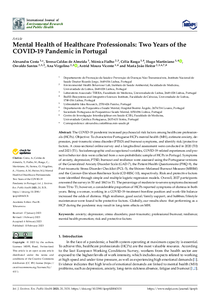Mental health of healthcare professionals: two years of the COVID-19 pandemic in Portugal

International Journal of Environmental Research and Public Health
2023
20
4
3131
epidemic disease ; mental health ; burnout ; anxiety ; healthcare worker
Psychosocial risks
https://doi.org/10.3390/ijerph20043131
English
Bibliogr.
"The COVID-19 pandemic increased psychosocial risk factors among healthcare professionals (HCPs). Objective: To characterize Portuguese HCPs mental health (MH), estimate anxiety, depression, post-traumatic stress disorder (PTSD) and burnout symptoms, and identify risk/protective factors. A cross-sectional online survey and a longitudinal assessment were conducted in 2020 (T0) and 2021 (T1). Sociodemographic and occupational variables, COVID-19-related experiences and protective behavior data were collected from a non-probabilistic sample of HCPs in Portugal. Symptoms of anxiety, depression, PTSD, burnout and resilience were assessed using the Portuguese versions of the Generalized Anxiety Disorder Scale (GAD-7), the Patient Health Questionnaire (PHQ-9), the Post-traumatic Stress Disorder Checklist (PCL-5), the Shirom–Melamed Burnout Measure (MBSM) and the Connor–Davidson Resilience Scale (CD-RISC-10), respectively. Risk and protective factors were identified through simple and multiple logistic regression models. Overall, 2027 participants answered the survey in T0 and 1843 in T1. The percentage of moderate-to-severe symptoms decreased from T0 to T1; however, a considerable proportion of HCPs reported symptoms of distress in both years. Being a woman, working in a COVID-19-treatment frontline position and work–life balance increased the odds of distress. High resilience, good social/family support, and hobbies/lifestyle maintenance were found to be protective factors. Globally, our results show that performing as a HCP during the pandemic may result in long-term effects on MH."
Digital
The ETUI is co-funded by the European Union. Views and opinions expressed are however those of the author(s) only and do not necessarily reflect those of the European Union or the ETUI.